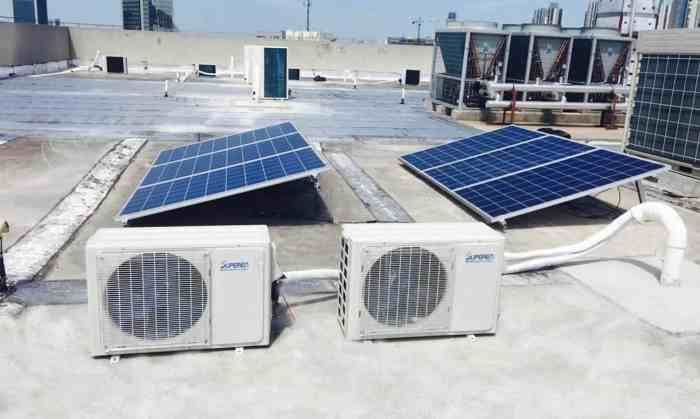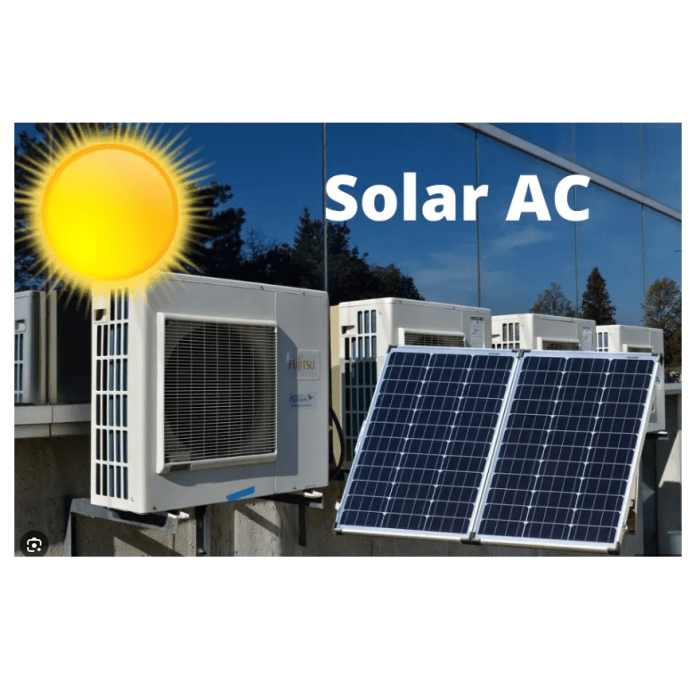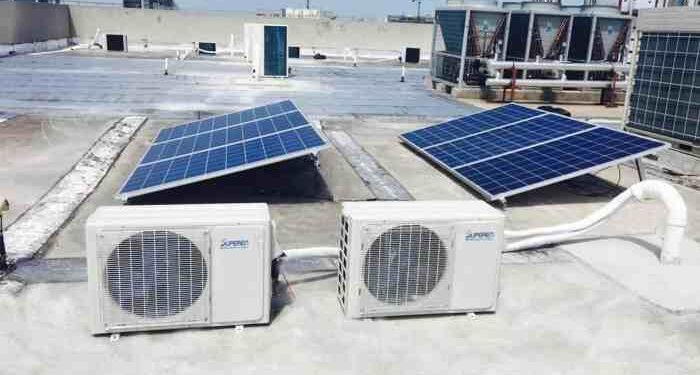Kicking off with Solar-powered air conditioners: Are they worth it?, this opening paragraph is designed to captivate and engage the readers, setting the tone casual formal language style that unfolds with each word.
The content of the second paragraph that provides descriptive and clear information about the topic
Introduction to Solar-Powered Air Conditioners
Solar-powered air conditioners utilize photovoltaic panels to convert sunlight into electricity, which powers the cooling system. These systems are designed to reduce energy consumption and lower electricity bills.
Benefits of Using Solar-Powered Air Conditioners
- Cost Savings: By harnessing solar energy, users can significantly reduce their electricity bills, especially during hot summer months.
- Environmentally Friendly: Solar-powered air conditioners produce clean energy, reducing carbon emissions and promoting sustainability.
- Energy Independence: Users can rely on solar power to cool their homes, reducing dependence on the grid during peak demand periods.
- Long-Term Investment: While the initial cost may be higher, solar-powered air conditioners offer long-term savings and a return on investment over time.
Potential Drawbacks or Limitations of Solar-Powered Air Conditioners
- Initial Cost: The upfront cost of purchasing and installing solar panels can be significant, deterring some individuals from investing in this technology.
- Weather Dependency: Solar-powered air conditioners depend on sunlight to generate electricity, making them less effective during cloudy or rainy days.
- Space Requirements: Adequate roof space or installation area is needed to accommodate the solar panels, which may not be feasible for all households.
Energy Efficiency Comparison
When comparing the energy efficiency of solar-powered air conditioners with traditional AC units, it's important to consider various factors that contribute to their efficiency.
Key Factors for Energy Efficiency
- Solar-powered air conditioners utilize renewable energy source - the sun, which reduces dependency on electricity from the grid.
- These units are designed to be more energy-efficient, with advanced technologies such as inverter compressors and smart controls that optimize energy usage.
- The installation of solar panels for powering the air conditioner allows for off-grid operation, further enhancing energy efficiency.
Impact on Cost Savings and Environmental Benefits
- Due to their energy efficiency, solar-powered air conditioners can lead to significant cost savings on electricity bills over time.
- By reducing reliance on fossil fuels for electricity generation, these units help lower greenhouse gas emissions and contribute to a cleaner environment.
- The long-term environmental benefits of using solar power for cooling purposes include mitigating climate change and promoting sustainability.
Cost Considerations
When considering solar-powered air conditioners, one of the primary concerns for consumers is the cost implications. Here, we will delve into the initial costs, long-term savings, and financing options associated with investing in solar-powered AC units.
Initial Cost
Switching to a solar-powered air conditioner involves a higher initial investment compared to traditional AC units. The cost can vary depending on the size of the system, the brand, and the installation requirements. On average, homeowners can expect to pay between $2,000 to $8,000 for a solar-powered AC unit.
Long-Term Savings and ROI
Despite the higher upfront costs, solar-powered air conditioners offer substantial long-term savings. By harnessing energy from the sun, these units can significantly reduce electricity bills over time. On average, homeowners can save up to 30% to 50% on cooling costs annually.
This translates to a return on investment within 5 to 10 years, depending on energy usage and local electricity rates.
Financing Options
For those concerned about the initial investment, there are various financing options available to make the transition to solar-powered air conditioning more affordable. Some options include solar loans, leasing programs, and government incentives such as tax credits or rebates. These financial incentives can help offset the initial costs and make solar-powered AC units a more attractive and feasible option for homeowners.
Environmental Impact
Solar-powered air conditioners offer significant environmental benefits compared to traditional AC units powered by fossil fuels. By harnessing the power of the sun, these systems help reduce carbon emissions and combat climate change.
Reducing Carbon Footprint
Solar-powered air conditioners operate using clean and renewable energy from the sun, eliminating the need for electricity generated by burning fossil fuels. This shift to solar energy significantly reduces the carbon footprint associated with cooling homes and buildings, as solar power produces zero greenhouse gas emissions.
- Solar-powered AC units help decrease reliance on non-renewable resources like coal and natural gas, which are major contributors to carbon dioxide emissions.
- By utilizing solar energy, these systems play a crucial role in mitigating the negative impact of traditional air conditioning on the environment.
- Reducing carbon footprint through solar-powered cooling solutions is a key strategy in combating global warming and climate change.
Positive Environmental Impact
Studies have shown that the widespread adoption of solar-powered air conditioners can lead to substantial environmental benefits. According to research conducted by environmental organizations and energy agencies, the use of solar energy for cooling purposes has resulted in a noticeable decrease in greenhouse gas emissions and an overall improvement in air quality.
Solar-powered AC units have been proven to reduce carbon emissions by up to 50% compared to conventional air conditioners powered by grid electricity.
- Case studies in various regions have demonstrated the positive impact of solar-powered cooling systems on reducing pollution and improving environmental sustainability.
- The deployment of solar-powered air conditioners contributes to the overall transition to clean energy sources, aligning with global efforts to combat climate change.
- By choosing solar energy for air conditioning needs, individuals and businesses can make a significant difference in preserving the environment for future generations.
Maintenance and Durability

When it comes to solar-powered air conditioners, understanding the maintenance requirements and durability is crucial for ensuring optimal performance and longevity of the system.
Maintenance Requirements
- Regular cleaning of solar panels to ensure maximum sunlight absorption.
- Inspecting and cleaning the air filters to maintain airflow and efficiency.
- Checking the refrigerant levels and ensuring there are no leaks.
- Scheduling professional maintenance checks at least once a year.
Durability and Lifespan
- Solar-powered AC units are generally more durable than traditional models due to fewer moving parts.
- The lifespan of a solar-powered air conditioner can range from 15 to 20 years, compared to 10-15 years for traditional units.
- Proper maintenance and care can significantly extend the lifespan of solar-powered AC units.
Tips for Longevity
- Ensure proper installation by a certified technician to avoid issues in the future.
- Keep the solar panels clean and free from debris for optimal efficiency.
- Monitor and maintain the battery storage system for consistent power supply.
- Regularly check for any leaks or damage in the system and address them promptly.
Final Summary

The content of the concluding paragraph that provides a summary and last thoughts in an engaging manner
FAQ Overview
Are solar-powered air conditioners more energy-efficient than traditional AC units?
Yes, solar-powered air conditioners are generally more energy-efficient due to their reliance on renewable energy sources like the sun.
What are the long-term cost savings of investing in a solar-powered air conditioner?
Over time, the savings from reduced energy bills can offset the initial higher cost of purchasing and installing a solar-powered air conditioner.
How do solar-powered air conditioners contribute to reducing carbon footprint?
By using clean energy from the sun, solar-powered air conditioners help reduce reliance on fossil fuels, which are major contributors to carbon emissions.
What maintenance requirements do solar-powered air conditioners have?
Solar-powered air conditioners require regular cleaning of panels and occasional professional check-ups to ensure optimal performance.











